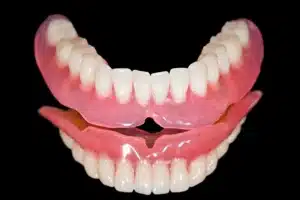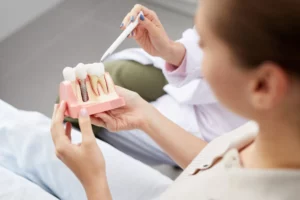Getting new dentures can be an uncomfortable experience for many people, as it often involves soreness and discomfort during the initial adjustment period. This discomfort typically stems from the pressure exerted by the dentures on the gums and oral tissues. However, it’s essential to understand that this discomfort is usually temporary and tends to diminish as the mouth adapts to the dentures. Effective denture care, including proper cleaning and regular adjustments by a dentist, can help alleviate discomfort and ensure a better fit. It’s crucial to communicate any persistent or severe pain to your dentist for appropriate evaluation and treatment. With patience and proper care, most individuals can overcome the initial discomfort associated with new dentures and enjoy improved oral health and function.
What are Dentures?
Dentures are removable dental appliances designed to replace missing teeth and surrounding tissues. They are custom-made to fit comfortably in the mouth and restore the appearance and functionality of natural teeth. Dentures consist of artificial teeth attached to a pink or gum-colored acrylic base, which rests on the gums and jawbone. These prosthetic devices are used to improve chewing and speech, support facial muscles to prevent sagging, and enhance the smile’s aesthetics. Dentures come in various types, including full dentures, which replace all teeth in the upper or lower arch, and partial dentures, which replace several missing teeth and are supported by remaining natural teeth or dental implants. They play a crucial role in restoring oral health, confidence, and quality of life for individuals with missing teeth.
Do Dentures Hurt Upon Placement?
One of the most common questions among individuals getting dentures is whether they hurt upon placement. The experience varies from person to person, but it’s not uncommon to feel some discomfort initially. This discomfort is typically due to the adjustment period as your mouth adapts to the new prosthetic. However, modern dentistry aims to minimize discomfort during the fitting process by ensuring proper measurements and adjustments. Additionally, dental professionals often provide guidance on managing any discomfort and offer solutions to alleviate pain. While some initial soreness or discomfort is normal, severe or persistent pain should be addressed with your dentist promptly to ensure proper fit and comfort.
When Do You Need Dentures?
The need for dentures often arises when individuals experience significant tooth loss or damage that affects their ability to chew, speak, or maintain oral health. Several factors can contribute to the need for dentures, including advanced gum disease, severe tooth decay, trauma or injury to the mouth, and genetic conditions that affect dental development. Additionally, untreated dental issues can lead to progressive tooth loss over time, necessitating the use of dentures to restore function and aesthetics. Dentists assess each patient’s unique situation to determine if dentures are the appropriate treatment option, considering factors such as the number of missing teeth, overall oral health, and the patient’s preferences and goals.
The Different Types of Dentures
Dentures are versatile dental appliances designed to replace missing teeth and restore oral function. There are several types of dentures available, each catering to different needs and preferences:
Full Dentures:
Also known as complete dentures, full dentures are used when all teeth in the upper or lower arch are missing. These dentures consist of a complete set of artificial teeth attached to a gum-colored acrylic base. Full dentures are custom-made to fit snugly over the gums and are held in place by suction or dental adhesive.
Partial Dentures:
Partial dentures are used when some natural teeth remain in the upper or lower arch. They consist of artificial teeth attached to a metal or acrylic framework that clasps onto adjacent natural teeth for support. Partial dentures are an excellent option for restoring function and aesthetics while preserving remaining natural teeth.
Implant-Supported Dentures:
Implant-supported dentures are attached to dental implants surgically placed in the jawbone. These dentures offer increased stability and support compared to traditional dentures, as they are anchored securely to the implants. Implant-supported dentures can be either removable or fixed, providing patients with a comfortable and reliable tooth replacement solution.
Overdentures:
Overdentures are similar to implant-supported dentures but are designed to fit over natural teeth roots or dental implants that protrude from the gumline. By preserving natural tooth structure or implants, overdentures offer enhanced stability and support while reducing bone loss in the jaw.
Immediate Dentures:
Immediate dentures are placed immediately after tooth extraction, allowing patients to have a complete smile during the healing process. These temporary dentures are pre-made based on impressions taken before tooth removal and are adjusted as the gums heal. Once the gums have fully healed, immediate dentures may be replaced with conventional dentures for a better fit.
Each type of denture has its advantages and disadvantages, and the choice depends on factors such as the number of missing teeth, jawbone health, and patient preferences. Consulting with a dentist or prosthodontist can help determine the most suitable denture option for individual’s needs.
How to Treat Denture Pain

Denture pain can be uncomfortable, but there are several ways to alleviate discomfort and improve the fit of your dentures:
Adjustments:
If your dentures are causing sore spots or irritation, your dentist can make adjustments to improve the fit. This may involve reshaping the dentures or adjusting the clasps to reduce pressure on sensitive areas of your gums.
Relining:
Over time, changes in the shape of your jawbone or gums can cause dentures to become loose or ill-fitting. Relining involves adding material to the base of the dentures to improve their fit and reduce discomfort.
Good Oral Hygiene:
Proper oral hygiene is essential for preventing irritation and infection. Clean your dentures daily with a denture brush and mild soap or denture cleaner. Remove your dentures at night to give your gums a chance to rest and recover.
Use of Denture Adhesives:
Denture adhesives can help improve the stability and retention of your dentures, reducing movement and discomfort. However, be sure to use adhesives as directed and avoid overuse, as excessive adhesive can cause gum irritation.
Pain Relief:
Over-the-counter pain relievers such as ibuprofen or acetaminophen can help alleviate denture-related discomfort. Follow the recommended dosage instructions and consult your dentist if pain persists.
Soft Diet:
Stick to soft or liquid foods if your gums are sore or tender. Avoid hard, crunchy, or sticky foods that can cause further irritation or dislodge your dentures.
Regular Dental Checkups:
Schedule regular checkups with your dentist to ensure your dentures fit properly and address any concerns or discomfort. Your dentist can also monitor your oral health and recommend additional treatments or adjustments as needed.
By following these tips and working closely with your dentist, you can effectively treat denture pain and enjoy improved comfort and function with your dentures.
Need Help With Your Denture Care?
Dentures serve as a common solution for individuals missing teeth, providing them the opportunity to eat comfortably and smile confidently. However, newcomers to dentures often wonder about the potential discomfort associated with them. While it’s normal to experience some initial discomfort, proper care and regular adjustments can mitigate any pain or irritation. Adhering to your dentist’s guidance on cleaning and maintenance is crucial for ensuring your dentures fit well and remain durable. Should you encounter persistent discomfort, seeking professional assistance from skilled dentists is advisable. At Normandale Dental, we offer comprehensive dental services, including denture fittings and adjustments. If you require assistance with denture care or experience any discomfort, don’t hesitate to reach out to us. Schedule an appointment today through our website to embark on the journey toward a comfortable and confident smile.





